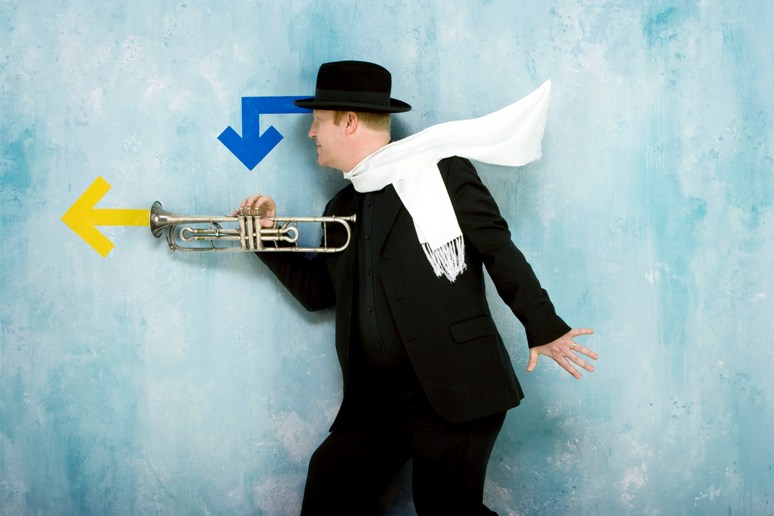While the embers of the concert year are dying out around the country, you can be sure of a great blaze-up at St John’s Smith Square. The annual Christmas Festival of quality early-music groups and top choirs – this is the 29th – now traditionally culminates in two great works for chorus and orchestra. Over the past three years I’ve reeled at the best of Messiahs, four cantatas out of the six making up Bach’s Christmas Oratorio – and now that God of music’s ultimate demonstration of his omnipotent range.
The B minor Mass may seem even less seasonal than two-thirds of Messiah, but it has its equal share of angels from the realms of glory, with David Blackadder (pictured below in one of the Orchestra of the Age of Enlightenment's publicity campaigns, fun but don't blame the trumpeter) playing Gabriel as archangel of the trumpet trio and producing silvery yet piercing sounds from what by now should be the irreplaceable period instrument in these works. Then there’s the chorus. I doubt if, even with previous near-perfection from the choirs of The Sixteen and Clare College, I’ve ever heard more focused brilliance in Bach’s insanely florid runs than from the 40-something voices in the Choir of Trinity College, Cambridge.
 True, the evening didn’t get off to a perfect start, with the briefest moment of mud from the men in the opening chords of the Kyrie and a tempo bump from conductor Stephen Layton in the first duet. But it could rarely be faulted after that, with OAE strings instilling absolute ease and confidence.
True, the evening didn’t get off to a perfect start, with the briefest moment of mud from the men in the opening chords of the Kyrie and a tempo bump from conductor Stephen Layton in the first duet. But it could rarely be faulted after that, with OAE strings instilling absolute ease and confidence.
The quality of three of the soloists, Christmas Festival regulars, one could take for granted: soprano Katherine Watson and Neal Davies, more baritone than bass, are lightish but supremely musical singers, Davies shining more in the poise of “Et in spiritum sanctum” than in “Quoniam tu solus”, which seems to have been written for a lower range (and also had the drawback of Roger Montgomery, usually a peerless player, finding difficulty with his horn in the obbligato). Iestyn Davies was flawless as ever, each year seeming to find more lights and colours in the countertenor voice than I used to think possible; 2014 has been exceptional for him even by his own highest standards. New on the scene was tenor Gwilym Bowen, still at the Royal Academy of Music and yet to relax on the platform – that's understandable enough – but a promising and agile voice even so.
I teared up at the three usual points, though hearing different emphases. Though I grew up with the Karajan recording of the B minor Mass, and James Galway, then Berlin Philharmonic principal, peerless in the flute duet and solo, the more haunting sound of the period-instrument equivalent produced greater wonders here in the expressive adornment to the choir’s infinitely expressive “Qui tollis”. In fact the subtlest wonder of this performance was how instrumental lines always shone through even with the choir in richest form, from Lisa Beznosiuk on the top line here to Chi-chi Nwanoku’s incisive doubling of the basses’ descent in the Sanctus – which, of course, has to be the tears-for-joy passage in excelsis; I’m glad Layton swung the heavenly hammer at a spacious pace, where the tendency is too often to rush. And the final “Dona nobis pacem” was the serious seal on the entire masterpiece, rising to a sumptuousness one wouldn’t have thought possible in St John’s – and a last climb above the sopranos’ line from Blackadder.














Add comment